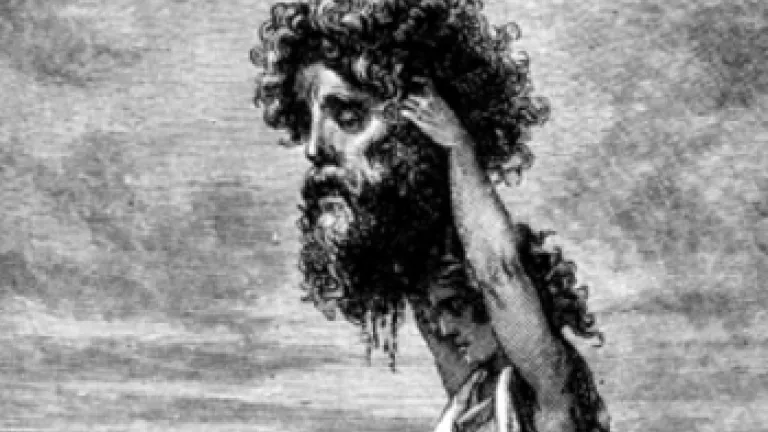2 Samuel 5:6-10 and Related
Conquest of Jerusalem, chiefs of David's mighty men, drink from the well of Bethlehem
City of David
At the time of David's siege, Jerusalem is called Jebus, which, interestingly, means "Trodden Underfoot" (New Open Bible, Topical Index, Thomas Nelson Publishers, 1990). Upon Israel's entrance into the Promised Land, it was allotted to the tribes of Judah and Benjamin. But these tribes only briefly defeated the Canaanite inhabitants of Jebus (Judges 1:8), for the Jebusites were soon back in their fortress city (see Judges 19:10-12).
"The city itself was strategically located in the hill country near the border of Judah and Benjamin, making it a foreign wedge between the northern and southern tribes" (Nelson Study Bible, note on 2 Samuel 5:6-9). Jerusalem was originally a fortress built on a high hill between two valleys that converged in a V formation. The steep sides of the hill, combined with the city's walls, made it seemingly impossible to penetrate. The Jebusites are so confident in the safety of their walls that they mock David, possibly placing the blind and lame in positions that are in full view of the Israelite troops.
But considering what is written concerning the skill, wisdom and bravery of the men who are now united under David's leadership, it is not so surprising that Jerusalem is conquered. David challenges his men to enter the city "by way of the water shaft" (verse 8). This shaft "extended about 230 feet up from the Gihon spring to the top of the hill where the Jebusite fortress was situated (2 Chronicles 32:30). The tunnel gave the city a secure water supply in the event of a siege" (note on verse 8). The account in Chronicles reveals that it is Joab who runs with David's challenge and leads the first invasion of the city, earning him the position of captain over all of Israel's army. David then makes this fortress city of such great strategic value his own new capital, calling it the City of David.
David also exercised considerable diplomatic wisdom here. Rather than choosing as his capital a city held by one of the 12 tribes of Israel (or one of the two kingdoms) and thus being perceived as favoring that one, David chose a city that belonged to none of the tribes and was thus viewed as neutral. In similar manner, the government of the United States early on placed its national capital, Washington, in the District of Columbia, a territory bordering two states but that did not belong to any state, so as not to be seen as favoring one state over another.
Mighty Men
Continuing, we then read about the "mighty men" of David. An elite group of three of these warriors is listed first with their individual claims to fame. As we will see in our next reading, another elite group of three is also mentioned, which includes Joab. However, this other trio, we are told, does not compare with the "first three" (1 Chronicles 11:20-21)—and neither does another group (verses 22-25). One member of the first group is not mentioned by name in 1 Chronicles 11, but his name is given in 2 Samuel 23 as Shammah the son of Agee the Hararite (verse 11). Another is mentioned in both passages as Eleazar the son of Dodo, the Ahohite (1 Chronicles 11:12; 2 Samuel 23:9). The other, mentioned first, is listed in 1 Chronicles 11 as Jashobeam the son of a Hachmonite (verse 11) and in 2 Samuel 23 as Josheb-Basshebeth the Tachmonite (verse 8). This name is probably a play on the words of his real name. For Tachmonite denotes "wise" (New Open Bible, Topical Index). And Josheb-Basshebeth, which sounds similar to Jashobeam, literally means "One Who Sits in the Seat" (Nelson Study Bible,margin). This could denote his exalted position as "chief of the captains" (1 Chronicles 11:11)—in exploits, not rank, as Joab was chief over the others in authority (verse 6).
Another apparent discrepancy is that 1 Chronicles 11:11 says Jashobeam killed 300 men at one time while 2 Samuel 23:8 says he killed 800 at one time. Yet, while it is uncertain just how to reconcile these verses, that does not make them irreconcilable. One possibility is that a particular military engagement went on for a few days with 300 killed in one day and 500 others killed on the other days. Another possibility is that these were two separate occasions, and that he was known for both.
We also see here the amazing account of the obtaining of water from the well of Bethlehem. It is not entirely clear whether this was done by the group of three just mentioned or another unnamed group of three. Since individuals are named throughout the account, and since 2 Samuel 23:17 says "these things"—rather than just the one act of getting the drink—were done by "the three mighty men," and since the named individuals in verses 8-39 add up to the total of 37 in verse 39, it is most likely that the three who got the water are the same men first listed, Jashobeam, Eleazar and Shammah. Regardless, these scriptures show us the strength and loyalty of the men who served under David. These three were willing to give their lives just to get David, their commander-in-chief, a drink of water.
But David refuses to drink it, calling it "blood" because it was brought to him at tremendous risk of life, and he pours it out in offering to God (verses 16-17). "Ordinarily, wine was used for a drink offering (Lev. 23:13, 18, 37); here, water more costly than the finest wine was poured in celebration before the Lord" (Nelson Study Bible, note on verse 16).
This is an outstanding example of godly leadership. Such respect for his men and such personal humility must have inspired even greater loyalty.




Beyond Today Bible Commentary: 2 Samuel